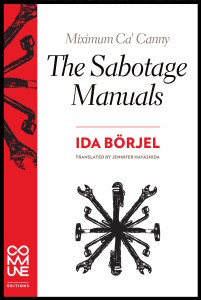Miximum Ca’ Canny the Sabotage Manuals
by Ida Börjel (translated by Jennifer Hayashida)
available November 2016
At once practical handbook and philosophical inquiry, Ida Borjel’s exploration of sabotage and its history throws a wrench into the machinery of contemporary language, generating strange affinities between wreckers, iconoclasts, and saboteurs of all types. Sourced from political pamphlets and factory workers’ diaries, and drawing out important connections between technology and poetic technique, Borjel’s profound poem allows for the most expansive (and explosive) understanding of sabotage – technological, political, economic, and linguistic all at once. Silencing the machines, these sabotaged manuals allow us to hear new sounds and new possibilities for resistance.
One of the most important poets in Scandinavia… Kamilla Löfström, Information
The instructions [in The Sabotage Manuals] are restrained, instrumental, seemingly naive ( “so simple to place something in one/spot instead of another”) but then there is this implied “human factor,” where the individual is actually required to commit a deliberate error. Particularly remarkable is the psychological range of the destructive activities, for instance the relation between setting something on fire vs. acting like an idiot. . . In the series “silences, gaps in the factory matrix,” the factory matrix is communication itself and another form of sabotage is proposed – silence.—Mira Langeland, from the preface to the original Swedish edition
an excerpt
now and then when I want half a day off and
they don’t give it to me I let the belt slither off
the machine so that it doesn’t work and I get
my half day I don’t know if you call it
sabotage but that’s what I do
delay give the wrong happen
to disconnect forget
mutter make conversations difficult or
impossible to understand
distort telegrams so that additional ones need to be
composed sometimes simply by
changing a letter from “minimum” to
“miximum” then they won’t know if
minimizing or maximizing is at stake
a letter a punctuation mark to move a
comma from “access denied, control” to
“access, denied control”
at the screening of propaganda films place two or
three dozen large moths in a paper bag bring
to the movie theater place on the floor in an empty row
the moths will fly out into the theater
towards the light
and when they climb over the projector
the film becomes an agitated fluttering shadow play
so they will sound as though they were passing
through a thick cotton blanket with mouths
full of gravel
so that the line can no longer be used
so they do not move
but flutter disturb
the automated gaze
about the author and translator
Ida Börjel was born in 1975 in Lund, Sweden. For her first book, Sond (2004), she received the prestigious award Katapultpriset. Since then, she has written over six works, including Skåneradio, Konsumentköplagen: juris lyrik, and MA. She lives in Röstånga and works with the City Fables Group at Malmö University, exploring the way that stories about life in contemporary cities are negotiated, remediated and circulated.
Jennifer Hayashida is a writer, translator, and visual artist. Her most recent projects include translation from the Swedish of Athena Farrokhzad’s White Blight (Argos Books, 2015) and Karl Larsson’s Form/Force (Black Square Editions, 2015). She is director of the Asian American Studies Program at Hunter College, CUNY, and serves on the board of the Asian American Writers’ Workshop
$16 (U.S., Canada, and Mexico)
$19 (International)
or Lo, Lau, and Börjel for $40
Lo, Lau, and Börjel international for $48

